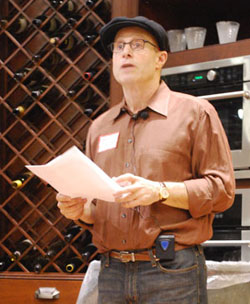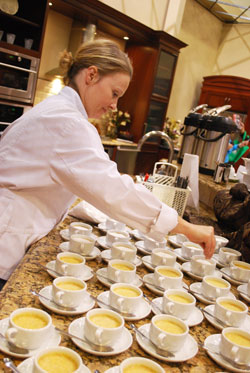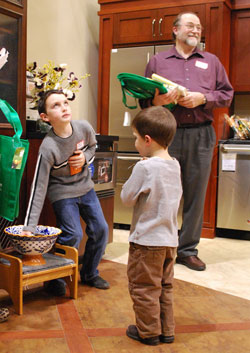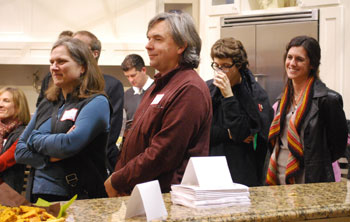Paul Saginaw: We Want to Change the World

Paul Saginaw, co-founder of Zingerman's, spoke about building a local "living economy" at Monday night's Think Local First annual meeting. (Photo by the writer.)
Paul Saginaw joked that during his senior year of high school, he was voted Least Likely to Have a Positive Impact on Society. The remark drew a laugh from the crowd of more than 100 people attending Think Local First’s annual meeting on Monday night – most of them know the Zingerman’s co-founder is an advocate for socially responsible business, as well as a driving force behind the nonprofit Food Gatherers, which launched 21 years ago this week.
For many years, that high school description was “so true,” Saginaw said. “But for the second half of my life, I’ve been trying to prove them wrong.”
Saginaw, the evening’s featured speaker, talked passionately about the need for local economies built around “human-scale” enterprises, with businesses as a positive force for social change. He described several ways that the Business Alliance for Local Living Economies, a national group, is supporting the efforts of small, independent businesses. The goal? “What we want to do is change the world,” he said.
BALLE – Building a National Network
Saginaw serves as vice chair of the board of directors for BALLE, the acronym of the Business Alliance for Local Living Economies. Judy Wicks – the group’s founder and owner of White Dog Cafe in Philadelphia – was the speaker at last year’s Think Local First annual meeting. [See Chronicle coverage: "Thinking (Eating, Drinking) Local First"]
At Monday’s event, held at Big George’s on West Stadium Boulevard, Saginaw described several initiatives that BALLE is undertaking. The group is a “network of networks,” he said – Think Local First is an affiliate – representing over 20,000 independent businesses in the U.S. and Canada. Their goal is to strengthen and connect these networks, helping communities build sustainable economies through independent retail, sustainable agriculture, green building, renewable energy, community capital, and zero-waste manufacturing. The organization is eight years old, Saginaw said, “but it’s starting to get traction now.”
Saginaw said that BALLE has secured major funding from the NoVo Foundation, led by the son and daughter-in-law of financier Warren Buffet. BALLE also has hired a new director, Michelle Long, who previously was co-founder and executive director of Sustainable Connections in Bellingham, Washington – an organization similar to Think Local First that eclipsed their local chamber of commerce in membership, Saginaw said.
BALLE will be pushing for public policy changes that favor small, independent businesses, Saginaw said. Right now, it’s easier to withdraw all of your savings and lose it gambling in Detroit’s Greektown Casino than it is to invest in a local business, he said, and that needs to change. It’s part of the concept of community capital – keeping dollars local, whether it’s buying from a locally owned shop or investing in a local business.
In addition, BALLE’s research and public policy director, Michael Shuman, will be putting out a monthly e-zine – a magazine distributed via email and other electronic means – on issues related to sustainable, living economies. Shuman is the author of “The Small-Mart Revolution: How Local Businesses Are Beating the Global Competition.” Copies of the book were raffled off during Monday’s event.
During the first part of his talk, Saginaw focused on the efforts of BALLE. He devoted the rest of his speech to an impassioned defense for the virtues of building sustainable local communities. In many cases, business has become an instrument of greed rather than one of social good, he said. But as local business owners, he continued, we know that business can be beautiful – an expression of personal creativity, providing meaningful work to others at a fair wage, and creating a mechanism for social change.
The latter kind of business, he said, is the foundation for a healthy community and a healthy democracy.
Think Local First: Looking Ahead
As part of Monday’s annual meeting, Ingrid Ault, executive director of Think Local First, gave brief remarks before Saginaw’s presentation. Ault said the group is focused on two main goals for the coming year: 1) overhauling their website, with help from Bonnie Valentine of The Whole Brain Group, and 2) applying to become a 501(c)3 nonprofit. The group’s current status as a 501(c)6 nonprofit does not allow them to apply for certain grants or take advantage of tax-deductible donations, she said.
Longer term, Ault said they hope to get sufficient funding to turn her part-time position into a full-time one, so that she’d have more time to devote to the buy local movement.

Natalie Marble, owner of Ann Arbor Cooks, sprinkles sugar on pumpkin crème brûlée to be served at the Think Local First gathering. Ann Arbor Cooks was one of several local businesses that provided food and beverages for the event. (Photo by the writer.)

Bonnie Valentine of The Whole Brain Group holds up a bowl to collect business cards – later, cards were drawn for raffle prizes. (Photo by the writer.)

Charlie Hickman, left, draws a business card out of the bowl to see who'll win a copy of Michael Shuman's book, "The Small-Mart Revolution: How Local Businesses Are Beating the Global Competition." Looking on is Charlie's brother Joe Hickman. In the background is Bob Dascola of Dascola Barbers. (Photo by the writer.)





Think Local with these jokals? I drove by the meeting, and there were more foreign cars in the lot than American. People can buy whatever kind of car they want, but don’t put a think local first on a foreign car… at least not in Michigan. They need to remember on what side their bread is buttered. Until then, this group is a true joke.
As a TLF board member I can point out that Big George’s parking lot was open for business that evening and its parking lot was available for customers only. Meeting attendees were directed to park at neighboring business lots. (Thanks to Kolossos Printing and Great Lakes Cycling and Fitness for their generosity!)
For Think Local First “local” means within Washtenaw County, and we support locally owned, independent businesses. The issue of whether cars produced by whatever foreign or domestic company are manufactured in this country (or this state) or not has been discussed elsewhere, so I won’t get into that.
I like to leave a response for Jay in the first post. It was nice for Steve to point out that the Think Local First Group parked in the neighboring business lots. Thank you.
Next, I like to comment on American Cars. Where do you think Ford and GM buys the robots to build those cars? Where do you think Ford and GM purchases the electronic components that go into the dash board? You think those American Car companies are thinking local first?
[link]
You probably submitted your post from a computer that was manufactured in Hong Kong.
It’s a global economy, get use to it.
This is the result of Capitalism, it’s time to think outside the box and change the monetary system.